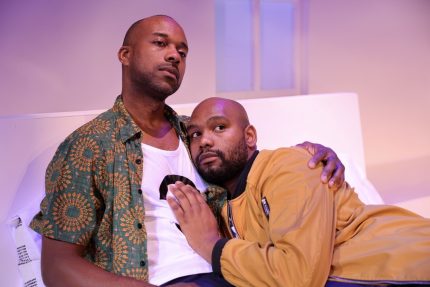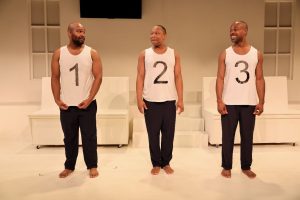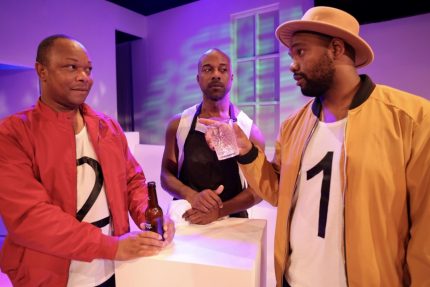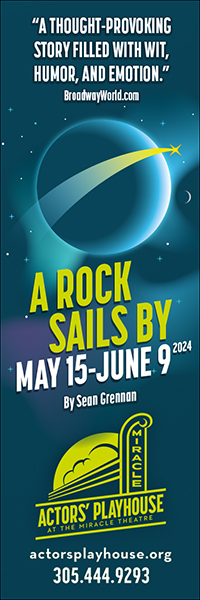
Nathaniel J. Ryan comforts Randall Swinton in ‘one of two’ at Island City Stage / Photos by Matthews Tippins
By Bill Hirschman
AIDS has been the focus of scores and scores of American plays and musicals: The Normal Heart, Angels in America, As Is, Rent. But while many works have been written since then, these enduring classics were written more than three decades ago documenting a very different time.
Donja R. Love’s one in two is a report from the front today when late night talk shows have plentiful ads for pills that will make the virus “undetectable” and restore the freedom to have casual sex or make love.
The engrossing evening at Island City Stage clearly depicts that despite the opportunity to live open-ended, being HIV-positive carries persisting onerous burdens that still have the power to emotionally cripple or even lead to suicide.
With a knife-sharp mix of wrenching emotion and copious humor, Love illustrates the overwhelming anxiety, the repercussions on interpersonal relationships, the prospect of living with something that causes most people straight and gay to treat you differently, plus a half-dozen other themes.
What ensues is rooted in the devastating statistic from a 2017 CDC study that found that one in two black gay or bisexual men will be diagnosed with HIV at some point in their life.
If you are a straight audience member who has lost touch with conditions today, the play is a reproachful reminder that the tragedies don’t remain in the past other than the automatic death sentence. If you are gay, it is a tableau acknowledging the continuing complexities you already know about while living HIV-positive in the 21st Century. It is an affirmation that someone hears you. You are not alone.
 The premise opens in a surreal stark white “waiting room” where we meet three nameless barefoot bare-chested black men dressed only in drawstring pants. Above their heads is a TV monitor announcing “0.”
The premise opens in a surreal stark white “waiting room” where we meet three nameless barefoot bare-chested black men dressed only in drawstring pants. Above their heads is a TV monitor announcing “0.”
They are very anxious, apparently being forced in the Beckett-nowhere setting to repeatedly reenact a tragic “tale” over and over and over. They reluctantly take parts by donning sleeveless T-shirts bearing the numbers 1, 2 and 3.
#1 is Donté, a playwright (Love wrote this while going through the same hell) who learns from a nurse that he has the virus. #2 and #3 portray an assortment of characters in his life ranging from his mom to a bar pickup to a married man he meets in a support group to a self-described “swishy queen.”
But Donté’s depression and emotional paralysis grow over the five years covered by this tale. And that video screen that started with an 0, now inexorably, implacably rises once the tale begins, tick by tick, second by second – a simultaneously reminder of ephemeral time passing towards a deadline, as well as, we guess, the number of gay men discovering they have HIV.
Donté wanders through alcoholism that doesn’t numb as well as he hopes, wild sex that doesn’t salve the hurt, the support group where he sees others are dealing with the same issues. He interacts gingerly and not always effectively with his mother, an ex-boyfriend and several others.
The fictional men performing for us on stage, outside of their characters in the Donté tale, deliver a growing sense that this ends in fatal tragedy.
One of the show’s toughest and most honest moments comes in a quiet scene in which #2 admits how he is more tormented by the expressions that he sees on the faces of people he tells about his condition than by anything else.
“I feel like I always see that face and always wonder, ‘Do they know about me?’ ‘Did they find out about me somehow?’ ‘Is that why you’re staring at me like that? Or you? Or you?’ Is it? It just feels… it just feels like (pointing to the audience) they have to watch me. Like they made up their mind to watch me, to make sure I don’t get too close, so I don’t ‘give them what I got.’ And all the while, they keep making that f—ing face. I hate that face so much. Like, stop.”
The ultimate question Love and his characters pose is whether people are locked into a tragic journey infinitely repeated, or do people have a choice, the power, the will to break the paradigm.
#2 says, “This is still an epidemic. One in two is an epidemic. But, it’s like people don’t care. Is it because I look the way I do? My story isn’t important because I don’t look like I could’ve been in The Normal Heart or Angels in A-f—-king-merica? Is that it? Well… I just wish everyone would stop staring at me, stop ‘wishing me well’ and do something.”
#3 says, “We don’t have a choice. This ain’t no game that you can cut on and off, or stop playing because it’s not going your way. This is a story. Donté’s story, that we have to tell. You don’t think I get tired of having to go through this story over and over again? I do it because us telling this story, letting them see this reality that maybe it won’t have to be our reality anymore. That maybe those numbers can stop growing. (Pointing to the audience) We’re here because of them. They came to see a story.”
But eventually Love insists the responsibility lies beyond, perhaps in spite of, the audience.
#2: “Maybe, maybe we aren’t trying hard enough to change it. (pointing to The Audience) Maybe if we get them to…..
#3: No, we’re done using them!”
This evening is solidly and deftly guided by visiting director Delicia Turner Sonnenberg who helmed the piece in San Diego last fall. She maintains Love’s double meta sense — actors on stage acknowledge that we in the audience are more than observers but actually part of the story, and the nameless actors locked in the room acknowledge that they are telling a tale that they drop in and out of.
The kicker at the start of this play is that the role of Donté is assigned by the audience in a clap-loudly-for-your-candidate. So every night, per the rules of this waiting room, Donté’s role could be given to any of the trio of men living in the waiting room. The other two men then play scissors-rock-paper to decide who takes the other two track of roles – each having to deliver multiple finely demarked character parts. We’re guessing that is meant to echo the cruel randomness of luck or fate. It also means all three Island City actors must know every line of the script.
Opening night, Donté was played by Randall Swinton, a local actor who has played secondary roles in several local productions, including the ambitious boss in Boca Stage’s Luna Gale. After portraying the nervousness that all three everymen display before the tale starts, Swinton convincingly dons Donté’s mostly quiet troubled persona as comfortably as putting on a jacket and quickly winning over the audience.
Kevane La’Marr Coleman, who did the play with Sonnenberg last year, played the married gay man seen at a self-help group, an ex-boyfriend and the sympathetic nurse giving the tests, medications and advice.
Nathaniel J. Ryan can be the mother one moment, the next an over-the-top queen with the name Banjii C—t.
Set and lighting designer Ardean Landhuis uses movable blocks and considerable lighting changes to switch locations as easily as the actors change characters. David Hart quietly slips in the sound environment. Intimacy Director Nicole Perry and Fight Director Paul Homza got a major workout because there are physical confrontations and – in half light – boiling sexual congress.
In the end, the production and the script create a contradictory sense of Brechtian distancing and a captivating story that both educates and motivates.
one in two runs through Sept. 4 at Island City Stage at Wilton Theatre Factory, 2304 N. Dixie Highway, Wilton Manors. The running time is 85 minutes no intermission. 8 p.m. Thursday, Friday and Saturday; 5 p.m. Sunday. Tickets $35. Call (954) 928-9800 or visit islandcitystage.org.
Covid Protocol: Masks are not required nor proof of vaccination








 A PaperStreet Web Design
A PaperStreet Web Design
